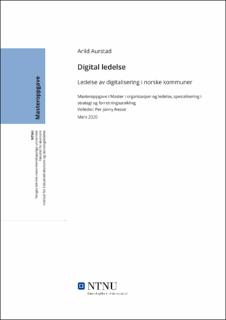| dc.contributor.advisor | Nesse, Per Jonny | |
| dc.contributor.author | Aurstad, Arild | |
| dc.date.accessioned | 2020-06-04T16:04:57Z | |
| dc.date.available | 2020-06-04T16:04:57Z | |
| dc.date.issued | 2020 | |
| dc.identifier.uri | https://hdl.handle.net/11250/2656806 | |
| dc.description.abstract | Denne masteroppgaven ser nærmere på ledelse av digitalisering i mellomstore kommuner. Digital ledelse er en «ny ledelsesdisiplin» som har vokst frem gjennom digitalisering. Det er stort fokus på digitalisering av kommunesektoren i Norge og de positive samfunnsmessige effektene som følger av digitalisering. Ledere i kommunene oppfordres og pålegges å drive digitaliseringsarbeid i sine virksomheter og bidra til gevinstrealisering som kommer samfunnet til nytte. Digital ledelse er ikke bare orientert rundt bruk av digitale verktøy, men de egenskaper, verktøy og kunnskap ledere trenger i dag for å lede sine organisasjoner gjennom løpende digitaliseringsprosjekter og digitale transformasjoner for å bidra til gode gevinster for virksomheter og samfunnet. Digitalisering og digitale transformasjoner bidrar til å skape gevinster for offentlige og privat virksomheter slik at de evner å være konkurransedyktige, men også bedre rustet for å møte morgendagens utfordringer. Det hviler et stort ansvar på lederne som har dette ansvaret. Gjennom intervjuer av 6 informanter i mellomstore kommuner ønsket jeg å få en dypere innsikt i kommunene sitt arbeid med digitalisering og hvordan de mener at kompetanse, kultur og organisatoriske forhold kan påvirke digitaliseringsreisen i positiv og negativ retning.
Empiriske funn viser at kommunene er noe reaktive som virker å være et resultat av lederne sitt fokus på å drive løpende organisasjonsutvikling med klare mål og visjoner, ansatte og ledere som har etterslep på kompetanse, teknologifrykt, kulturelle forhold som dårlig lojalitet til frister, arbeidspress, manglende endringsvilje, behov for mer kunnskap rundt prosjektledelse og prosjektorganisering, og lederes evne til å skape engasjement. Litteraturen beskriver at digitale ledere må ha ferdigheter, kunnskap og erfaring til å knytte teknologi til en strategisk fordel, ta teknologiske beslutninger og risikostyring, og bruke teknologi til å oppnå avkastning og synliggjøre verdiskapningen. Digitale ledere må arbeide mer proaktivt med sine organisasjoner gjennom kompetanseutvikling, organisasjonsutvikling og evne å drive god endringsledelse og skape engasjement og eierskap ut i organisasjonen. Kommunene virker å forstå hva som må til, men sliter med å operasjonalisere det.
Denne undersøkelsen har sine begrensninger og analysen kunne vært mer omfattende, men opplever at resultatet i total tilfører noe verdi både til denne nye ledelsesdisiplinen og til ledere og ledende funksjoner i kommunene. Håper også at dette bidrar til utvikling av nye problemstillinger og videre forskning rundt temaet digital ledelse. | |
| dc.description.abstract | This master thesis looks more closely at the management of digitalisation in medium-sized municipalities. Digital leadership is a "new management discipline" that has grown through digitalisation. There is a strong focus on digitalisation in the municipal sector in Norway and the positive social effects that result from digitalisation. Managers in the municipalities are encouraged and ordered to perform digitalisation in their businesses and contribute to profit realization that benefits society. Digital leadership is not only oriented to the use of digital tools, but the qualities, tools and knowledge leaders today need to guide their organizations through ongoing digitalisation projects and digital transformations to contribute to good profits for businesses and society. Digitalisation and digital transformations help create benefits for public and private businesses so that they can be competitive, but also better equipped to meet the challenges of tomorrow. There is a great responsibility on the leaders who have this responsibility. Through interviews of 6 informants in medium-sized municipalities, I wanted to gain a deeper insight into the municipalities' work on digitalisation and how they believe that knowledge, culture and organizational conditions can influence the digitalisation journey in a positive and negative direction.
Empirical findings show that the municipalities are somewhat reactive, which seems to be a result of their managers focus to drive continuous organizational development with clear goals and visions, employees and managers who have a lag on knowledge, technology fears, cultural conditions such as poor loyalty to deadlines, work pressure , lack of willingness to change, the need of more knowledge about project management and organizing projects, and leaders ability to engage. The literature describes that digital leaders must have the skills, knowledge and experience to link technology to a strategic advantage, make technological decisions and risk management, and use technology to achieve returns and make visible value creation. Digital leaders need to work more proactively with their organizations through skills development, organizational development and the ability to drive good change management and create commitment and ownership within the organization. The municipalities seem to understand what is needed, but struggle to operationalize it.
This study has its limitations and the analysis could have been more extensive but hope that the result in total adds some value both to this new management discipline and to managers and leading functions in the municipalities. Also hope that this contributes to the development of new issues and further research on the topic of digital leadership. | |
| dc.language | nob | |
| dc.publisher | NTNU | |
| dc.title | Digital ledelse - Ledelse av digitalisering i norske kommuner | |
| dc.type | Master thesis | |
